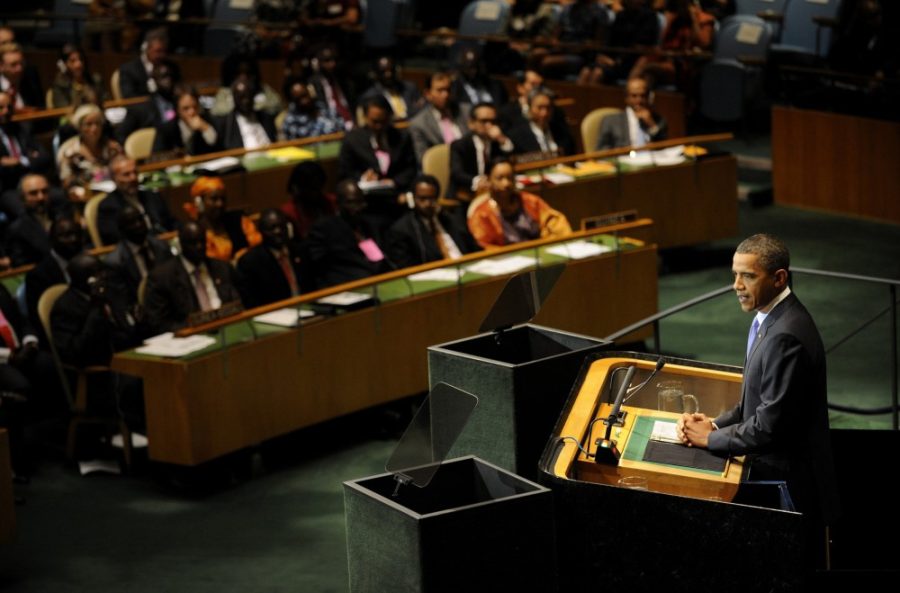UNITED NATIONS — Raising the stakes further in his high-risk drive to make Middle East peace, President Barack Obama on Thursday called on Arab states and others to do much more to support the peace talks and the fragile Palestinian leadership.
Using his annual U.N. General Assembly address to push an initiative that many in the Middle East think is doomed to failure, Obama diplomatically berated Arab leaders who have long demanded a stronger U.S. role in establishing a Palestinian state.
“”Many in this hall count themselves as friends of the Palestinians. But these pledges must now be supported by deeds. Those who have signed on to the Arab Peace Initiative should seize this opportunity to make it real by taking tangible steps toward the normalization that it promises Israel,”” Obama said, referring to a 2002 Arab peace offer.
“”Those who speak out for Palestinian self-government should help the Palestinian Authority politically and financially, and — in so doing — help the Palestinians build the institutions of their state,”” he said. “”And those who long to see an independent Palestine rise must stop trying to tear Israel down.””
Obama’s remarks reflected his administration’s frustration that Saudi Arabia and other Arab states besides Egypt and Jordan, which have made peace with Israel, have been cool to his efforts and have lagged in providing promised funds to the Palestinian Authority of President Mahmoud Abbas.
The amount of time he devoted to the issue was unusual, and the emphasis he put on it is risky. Obama took to the podium three days before Israel’s moratorium on new Jewish settlements in the West Bank is due to expire. The Palestinians have said they’ll bolt the talks if construction resumes, and it’s unclear whether a compromise can be found.
On another tough foreign policy problem, Obama met for two hours with Chinese Premier Wen Jiabao in a session dominated by Washington’s demands that China let its currency float freely, U.S. officials said.
There’s growing support on Capitol Hill for legislation to punish China. House of Representatives Speaker Nancy Pelosi, D-Calif., said Thursday that she supports a bill that would allow the Commerce Department to impose duties on Chinese goods to offset the reduced prices that are a product of what U.S. officials say is China’s artificially low exchange rate.
Obama “”made clear (to Wen) that we’re expecting to see more action, more significant movement”” on currency revaluation, said Jeffrey Bader, a senior U.S. National Security Council aide. “”If the Chinese don’t take action, we have other means of protecting U.S. interests,”” Bader said, apparently referring in part to action through the World Trade Organization.
On Iran’s suspected nuclear weapons program, Obama used his speech to tell Tehran that “”the door remains open to diplomacy.”” But he added that Iran must demonstrate a “”clear and credible commitment”” to addressing widespread suspicion that its nuclear work is aimed at developing a weapon.
Senior U.S. officials say that, in the aftermath of harsh international sanctions, Iran’s leaders are debating whether to resume negotiations.
In a reminder of the vast divide that separates the two countries, however, Iranian President Mahmoud Ahmadinejad suggested in a speech several hours after Obama’s that the U.S. government was behind the Sept. 11, 2001, terrorist attacks and that Israel was the beneficiary. The U.S. delegation and several European delegations walked out in protest, as the U.S. delegation also did last year.
“”Rather than representing the aspirations and goodwill of the Iranian people, Mr. Ahmadinejad has yet again chosen to spout vile conspiracy theories and anti-Semitic slurs that are as abhorrent and delusional as they are predictable,”” said Mark Kornblau, a spokesman for the U.S. Mission to the United Nations.
On Friday morning, Obama is scheduled to give an interview to the BBC’s Persian service, which is widely listened to in Iran, in an attempt to speak directly to Iranians.
Obama opened his speech Thursday by citing what he called his administration’s foreign policy accomplishments since taking office. He counted among them rescuing the global economy; winding down the war in Iraq and recalibrating U.S. anti-terrorism strategy; and securing loose nuclear materials, while signing a new arms control pact with Russia.
Then he quickly turned to the Middle East, urging Israel to extend its settlement moratorium, and Palestinians to keep the three-week-old talks going, regardless.
“”Israel’s settlement moratorium has made a difference on the ground, and improved the atmosphere for talks. Our position on this issue is well known. We believe that the moratorium should be extended,”” Obama told assembled world leaders.
But he quickly added: “”We also believe that talks should press on until completed. Now is the time for the parties to help each other overcome this obstacle.””
Obama got his most pronounced applause when he declared that, with perseverance, “”When we come back here next year, we can have an agreement that will lead to a new member of the United Nations — an independent, sovereign state of Palestine, living in peace with Israel.””
White House deputy national security adviser Ben Rhodes said Obama wants Arab states to give the Palestinian Authority more political support in the peace talks; to provide financial support; and to start talking about the eventual normalization of relations with Israel.
Abbas was seated in the General Assembly hall for Obama’s address. Israel’s table was empty, which an Israeli spokesman attributed to a religious holiday, Sukkot.









